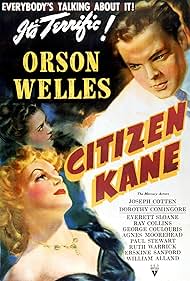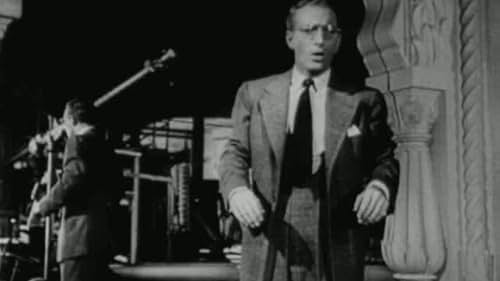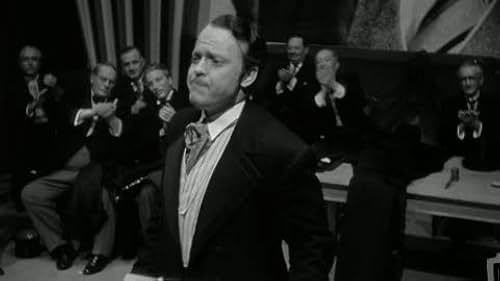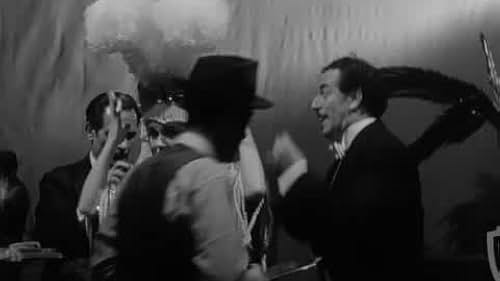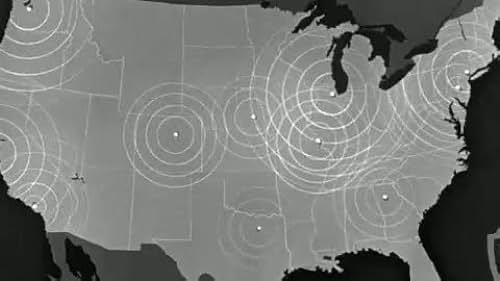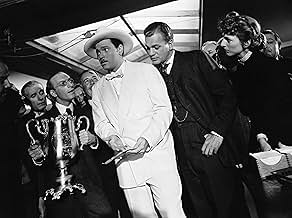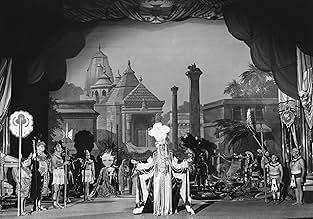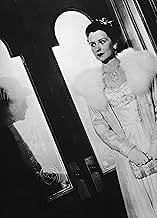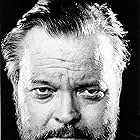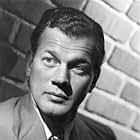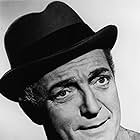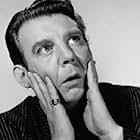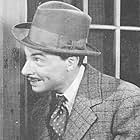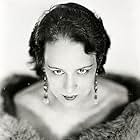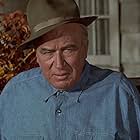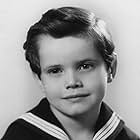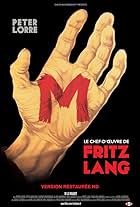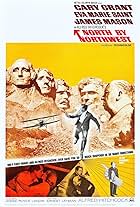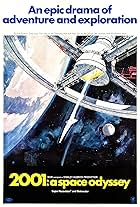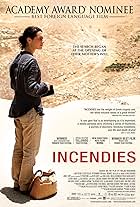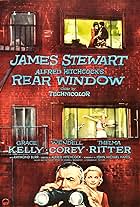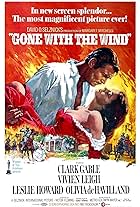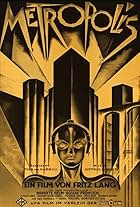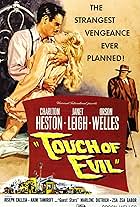Following the death of publishing tycoon Charles Foster Kane, reporters scramble to uncover the meaning of his final utterance: 'Rosebud.'Following the death of publishing tycoon Charles Foster Kane, reporters scramble to uncover the meaning of his final utterance: 'Rosebud.'Following the death of publishing tycoon Charles Foster Kane, reporters scramble to uncover the meaning of his final utterance: 'Rosebud.'
- Won 1 Oscar
- 11 wins & 13 nominations total
Storyline
Did you know
- TriviaDespite all the publicity, the film was a box-office flop and was quickly consigned to the RKO vaults. At the 1941 Academy Awards, the film was booed every time one of its nine nominations was announced. It was only re-released to the public in the mid-1950s.
- GoofsDuring the picnic scene towards the end, Welles had to shoot against a back-projection because a location shoot was too costly and time-consuming. The stock footage used for the exterior was taken from King Kong (1933), hence on closer inspection the four birds that fly by are in fact very definite pterodactyls. RKO told Welles to take the pterodactyls out of the shot, but he liked them, and decided to keep them.
- Quotes
Mr. Bernstein: Old age. It's the only disease, Mr. Thompson, that you don't look forward to being cured of.
- Crazy creditsIn a very rare move the director's credit is shown on the same card as the cinematographer's. This was Orson Welles's personal decision to show his thanks to cinematographer Gregg Toland for his enormous contributions to the film, meaning equal rights.
- Alternate versionsThe Italian-language version cut an overwhelming number of scenes, leading to "complete" versions of the film to be circa half of the time in English and only the remaining half in Italian.
- ConnectionsFeatured in The Projectionist (1970)
- SoundtracksIt Can't Be Love
(uncredited)
Written by Charlie Barnet and Haven Johnson
Arranged by The King Cole Trio
Performed by Raymond Tate, Buddy Collette, Buddy Banks, CeePee Johnson, and Alton Redd
Featured review
"Citizen Kane" is possibly the most acclaimed film that I know of. It's been called the "greatest film of all time" by a lot of film critics, polls, magazines, etc.
The film is a chronicle of the life of Charles Foster Kane, a fictional character based off of William Randolph Hearst, a famous newspaper publisher. The film's structure is highly unconventional, in which Kane's life is revealed through interviews with various people who knew him well, making a majority of the film a series of flashbacks.
On both a technical and story level the film is quite influential. The story, itself, becomes far more bleak and dark than a lot of the films coming out at that time (at least in the US, that is), and it completely insults a very powerful figure (that being William Randolph Hearst) who was still alive at the time, and fought to get the film banned (just watch the documentary "The Battle Over Citizen Kane" and the drama "RKO 281", two films that are also quite great).
On a technical level, there's many extremely inventive techniques being developed here. There's one particularly interesting low angle shot that was made so low because Welles actually drilled a hole in the floor of the set. Other than that shot, you mine as well look at every single other shot or scene if you want to see some technical innovation. You could just analyze it frame by frame if you want to attempt to see all of its influential visuals, and you still may not have truly seen all of the detail. As Roger Ebert said on the commentary, "Citizen Kane" is actually a special effects picture. The main difference between this film's special effects and the special effects in a film like "Jurassic Park" (another greatly influential film) is that the special effects in this film are kind of hidden, but nonetheless powerful in their own right.
A lot of people may call it the #1 most important film of all time, but I have to disagree. While it certainly is one of the most important films of all time, one really needs to go back to the silent era to find all the TRULY most important films. Films like "A Trip to the Moon", "The Great Train Robbery", "The Birth of a Nation", and "Intolerance". Welles, himself, actually did say during his introduction of D.W. Griffith's classic "Intolerance" that that film deserves all the credit for a lot of modern cinema's techniques.
However, with all its technical innovations that have been talked on and on about time and time again, I've heard very little about how ENTERTAINING the film is. "Well that's because it isn't entertaining!" I can hear some guy who had overly high expectations (and gave the film 1 star with a lengthy review entitled "Disappointing") shout. Well, you're wrong, the film is quite entertaining! Sure, there's no action sequences, explosions, Adam Sandler doesn't play his twin sister, and Kevin James doesn't wackily fall down 420,000 times, but there IS true human emotion, iconic lines of dialogue, and a truly compelling imagery that ends with one of cinema's greatest twists! There was actually a time in my life in which I watched "Citizen Kane" nearly once a day because I enjoyed it so much! I genuinely watched it TWICE in one day just because of how much I enjoyed it, which is very rare with me.
If you're looking for the greatest film of all time, maybe you should lower your expectations a tad bit and just experience the film for what it is.
The film is a chronicle of the life of Charles Foster Kane, a fictional character based off of William Randolph Hearst, a famous newspaper publisher. The film's structure is highly unconventional, in which Kane's life is revealed through interviews with various people who knew him well, making a majority of the film a series of flashbacks.
On both a technical and story level the film is quite influential. The story, itself, becomes far more bleak and dark than a lot of the films coming out at that time (at least in the US, that is), and it completely insults a very powerful figure (that being William Randolph Hearst) who was still alive at the time, and fought to get the film banned (just watch the documentary "The Battle Over Citizen Kane" and the drama "RKO 281", two films that are also quite great).
On a technical level, there's many extremely inventive techniques being developed here. There's one particularly interesting low angle shot that was made so low because Welles actually drilled a hole in the floor of the set. Other than that shot, you mine as well look at every single other shot or scene if you want to see some technical innovation. You could just analyze it frame by frame if you want to attempt to see all of its influential visuals, and you still may not have truly seen all of the detail. As Roger Ebert said on the commentary, "Citizen Kane" is actually a special effects picture. The main difference between this film's special effects and the special effects in a film like "Jurassic Park" (another greatly influential film) is that the special effects in this film are kind of hidden, but nonetheless powerful in their own right.
A lot of people may call it the #1 most important film of all time, but I have to disagree. While it certainly is one of the most important films of all time, one really needs to go back to the silent era to find all the TRULY most important films. Films like "A Trip to the Moon", "The Great Train Robbery", "The Birth of a Nation", and "Intolerance". Welles, himself, actually did say during his introduction of D.W. Griffith's classic "Intolerance" that that film deserves all the credit for a lot of modern cinema's techniques.
However, with all its technical innovations that have been talked on and on about time and time again, I've heard very little about how ENTERTAINING the film is. "Well that's because it isn't entertaining!" I can hear some guy who had overly high expectations (and gave the film 1 star with a lengthy review entitled "Disappointing") shout. Well, you're wrong, the film is quite entertaining! Sure, there's no action sequences, explosions, Adam Sandler doesn't play his twin sister, and Kevin James doesn't wackily fall down 420,000 times, but there IS true human emotion, iconic lines of dialogue, and a truly compelling imagery that ends with one of cinema's greatest twists! There was actually a time in my life in which I watched "Citizen Kane" nearly once a day because I enjoyed it so much! I genuinely watched it TWICE in one day just because of how much I enjoyed it, which is very rare with me.
If you're looking for the greatest film of all time, maybe you should lower your expectations a tad bit and just experience the film for what it is.
- framptonhollis
- Feb 14, 2016
- Permalink
Details
- Release date
- Country of origin
- Official site
- Languages
- Also known as
- El ciudadano Kane
- Filming locations
- Busch Gardens - S. Grove Avenue, Pasadena, California, USA(Xanadu Grounds, demolished)
- Production companies
- See more company credits at IMDbPro
Box office
- Budget
- $839,727 (estimated)
- Gross US & Canada
- $1,627,530
- Gross worldwide
- $1,707,502
- Runtime1 hour 59 minutes
- Color
- Aspect ratio
- 1.37 : 1
Contribute to this page
Suggest an edit or add missing content

